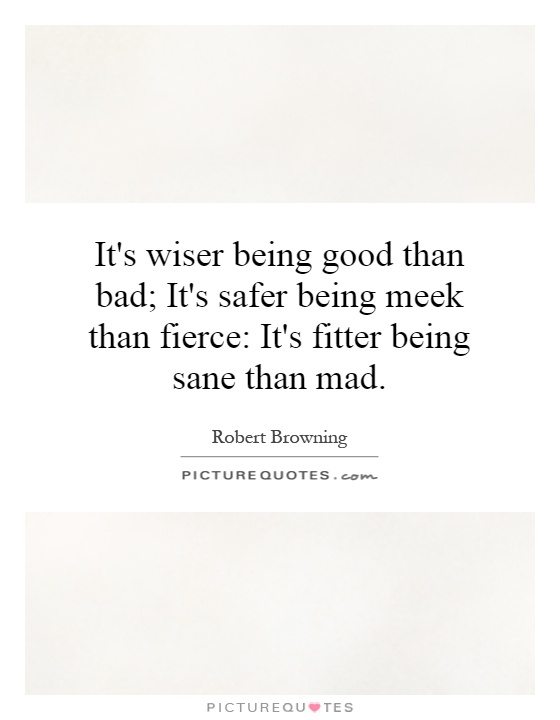It's wiser being good than bad; It's safer being meek than fierce: It's fitter being sane than mad

It's wiser being good than bad; It's safer being meek than fierce: It's fitter being sane than mad
Robert Browning, a renowned Victorian poet, often explored themes of morality, sanity, and the human condition in his works. In the context of his poetry, the lines "It's wiser being good than bad; It's safer being meek than fierce: It's fitter being sane than mad" hold significant meaning and reflect Browning's views on the importance of virtue, humility, and mental stability.Browning believed that it is wiser to choose goodness over evil, as the consequences of immoral actions can lead to destruction and regret. In his poem "My Last Duchess," Browning portrays the consequences of jealousy and pride through the character of the Duke, who ultimately leads to the demise of his wife. The Duke's lack of goodness and moral integrity ultimately leads to his downfall, highlighting Browning's belief in the importance of choosing goodness over wickedness.
Similarly, Browning emphasizes the importance of meekness over fierceness in his works. In "The Pied Piper of Hamelin," Browning tells the story of a town overrun by rats and saved by a mysterious piper. The piper's calm and gentle demeanor contrasts with the townspeople's fear and aggression, ultimately leading to a peaceful resolution. Browning suggests that meekness and humility are more effective in resolving conflicts than aggression and violence.
Lastly, Browning's emphasis on sanity over madness reflects his belief in the importance of mental stability and rationality. In his dramatic monologues, Browning often explores the inner workings of the human mind and the consequences of irrational behavior. In "Porphyria's Lover," Browning delves into the mind of a jealous lover driven to madness by his obsession with his beloved. The lover's descent into madness ultimately leads to a tragic outcome, highlighting Browning's belief in the importance of maintaining one's sanity.
Overall, Browning's exploration of morality, meekness, and sanity in his poetry reinforces the idea that it is wiser to choose goodness, safer to be meek, and fitter to be sane. Through his works, Browning encourages readers to reflect on their own actions and choices, ultimately leading to a deeper understanding of the human experience.












 Friendship Quotes
Friendship Quotes Love Quotes
Love Quotes Life Quotes
Life Quotes Funny Quotes
Funny Quotes Motivational Quotes
Motivational Quotes Inspirational Quotes
Inspirational Quotes